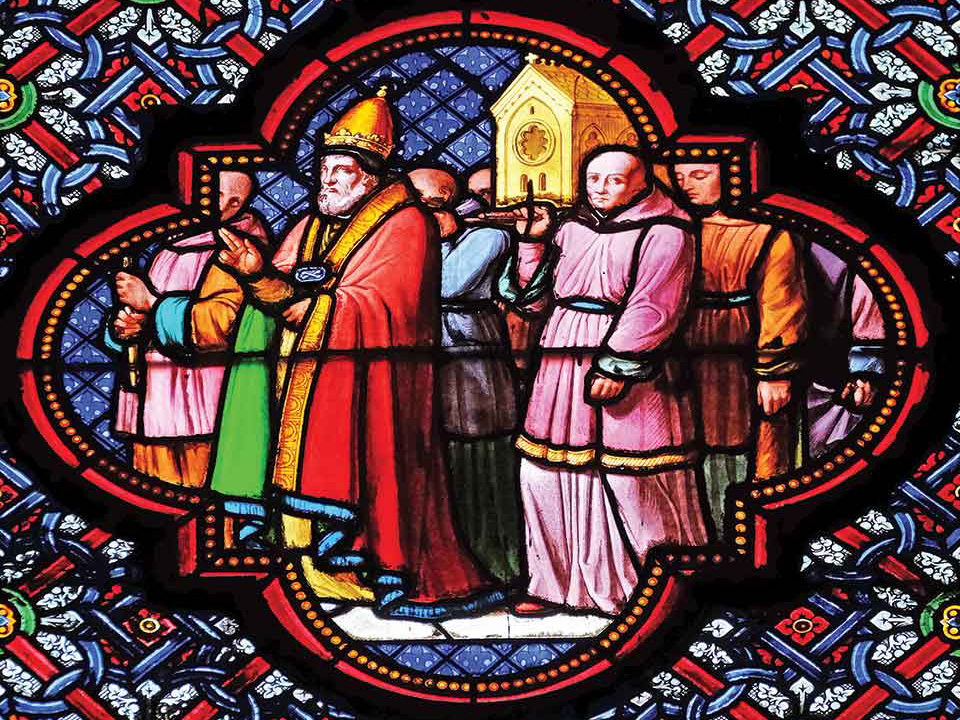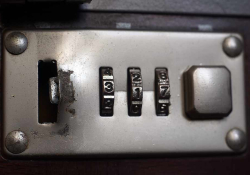Namesake

Named after a medieval French bishop, a transgender poet and essayist reflects on the inheritances we’re born with and those we fashion for ourselves.
A blinding light filled the sanctuary as the two vials, once empty, filled with chrism and oil of the catechumens. Candles dimmed in the wake of the sharp white light. The onlookers watched the vials with disbelief, but the moribund pagan had eyes only for Remigius, archbishop of Reims. Documentation of the legend of the Baptism of the Moribund Pagan, also known as Remigius and the Holy Ampulla, does not include description of white light, a shocked congregation, or a mesmerized pagan. In truth, the sixth-century baptism of a dying man may have been a nonevent with the exception of the miraculously filled baptismal artifacts. In his early twenties, Remigius was ordained as the archbishop of Reims in 459. He is most known for converting Clovis, king of the Franks, to Christianity in 496, along with three thousand of the king’s followers. Theologians credit the canonized archbishop with the miracle performed in the Baptism of the Moribund Pagan, a miracle confirmed upon the discovery of the same vials emitting an “unworldly” fragrance when his tomb was opened during the reign of Charles the Bald.
***
My own connection to France runs deep. My mom, a French professor and medievalist, went on sabbatical in 2000 in pursuit of Saint Martial, taking my dad, my twin sister, and me with her to Bretagne, or Brittany. Brittany is a rainy province in northern France, primarily dairy country, that draws much of its revenue from the local farming industry. Neither my sister nor I spoke French; it was a quick learning curve. By the end of our fourteen months there—at the end of which we would be eight years old—we would be fluent.
After spending our seventh birthday in Paris, we arrived in Brittany for what would be my sister’s and my second-grade year. My parents had rented what had once been an old chateau called Tréhorenteuc, or Tregarantec, which was now a dairy farm, except we weren’t staying in the chateau proper—we lived in a section of the property that was just outside the big house. On the phone years later, my mom describes the grand chateau as shaped like a huge semicircle, or something U-shaped. Our part of the property was at the end of one of the hedges of the semicircle. Our own French haven.
Tregarantec was in the small village of Mellionec. Mellionec’s geographical landscape is similar to rural Ohio or Michigan in soft rain with cows and abandoned wells and tractors. Tregarantec was a seventeenth-century chateau; my mom tells me now that it was rumored to have been a gift to one of Louis XIV’s mistresses. Our living space had two floors with the kitchen on the first floor and one or two bedrooms on the second floor. A clothesline ran through my parents’ bedroom, safe inside because it rained so frequently in Brittany. The kitchen was a claustrophobia of walls and cupboards.
My sister and I went to a Catholic school in the nearby town of Rostrenen called L’École Notre Dame. Though Catholic in name, it was run fairly secularly according to my mom, and it cost a mere ten euros, or eleven US dollars, a month. Our dad drove us down the long dirt driveway from Tregarantec each day. We had to time our arrival and departure perfectly so as not to get stuck behind the cows on their way to the milking parlor at regular intervals throughout the day. Sometimes if we were running late, we had to duck beneath the electric wire to get in the car. It was my favorite game.
I do not think I can offer anything new on the trope of foreboding nuns at Catholic school, but I will try. I remember that the nuns did not preside over every class, but when they did, they were fond of silence. There were other teachers of various subjects, our favorite named Mme. Brigitte, but the nuns led art class. We were frightened of one nun in particular: Sœur Marie. One day the nuns instructed us to make sculptures of clay mice. The clay was reddish-brown, like the dirt of where I live now in Oklahoma, but smooth. It smelled like baby powder. Two students sat at each table, and we were told to mold our clay mice together quietly. One mouse per student. We were not to speak. The mice were not to speak, either.
My sister and I were aware of this rule, though we either decided it wasn’t worth following or we simply couldn’t contain ourselves. I do remember finding something funny (was it the silence?) and laughing. We began a whispered mouse waltz, rolling the clay around the table. The reddish-brown left a streak on the surface. My mouse probably attacked her mouse. Or maybe the mice were best friends. Maybe my mouse was lonely. I’m sure the nuns punished us in some stern, guilt-ridden Catholic way.
My sister and I were aware of this rule, though we either decided it wasn’t worth following or we simply couldn’t contain ourselves.
***
Following Saint Remigius of Reims, France has remained a largely Christian (and, in later years, Catholic) nation. I am not a Catholic, but I am named after Saint Remigius—or, in my mother’s words, “retroactively named.”
I came out as trans to my parents with a nickname already chosen: Remi. “Remi” had been a term of endearment bestowed upon me by my best friend; it was a combination of “Remus”—after my favorite Harry Potter character, with whom I was obsessed—and my dead name. I was originally named after my maternal grandmother.
Family lineage is important to my mom in a somewhat surprising way. My parents didn’t raise my sister and me anywhere near our grandparents, a cool aunt, or even an awkward uncle. My mom grew up in northern California in a landscape similar to that of Brittany: rural and home to more than a few cows, though it was warmer and sunnier. My dad is from Williamsburg, Virginia. They met in California, long after my dad had been honorably discharged from the air force. From what I can gather, it was a whirlwind romance: my dad was a cook at a greasy diner and was about to quit, but he says that something told him to wait just a little bit longer. Three days later, my mom, a thin, blond Californian with striking blue eyes, was hired as a waitress. After more than thirty years of marriage, my mom says now, “One day we were working, and a red convertible drove past the set of windows outside. Our eyes met and the rest is history.” They saved their money for about six months and went biking across Europe. Several years later, in 1993, after grad school and living in various parts of the US, my mom got a job at a university in Michigan. Off they went, venturing bravely intro frostbite and hockey.
Contrary to my parents, I have always identified as a Midwesterner. Being a Michigander is more than just an accurate regional label—to me, it’s a legacy of loon calls, of gulping down lake water from the Upper Peninsula, of misspelling my hometown’s name even as an adult because it has too many vowels. As a kid, I went camping and kayaking, I wore my pajamas inside out for snow days, and I kept fireflies, tiny antennaed dancers, in glass jars. Even now, my wife and I plan to move back to Michigan after we earn our doctoral degrees.
But I know now (and I think I knew then, too) that I was not a normal Midwestern kid. I wouldn’t put all of the pieces together until later, but my body, with its breasts and periods, was slowly killing me.
***
One of several patron saints of France, Saint Remigius is also patron of snakes and religious indifference. While I’m not convinced that snakes need patronage—I’m reminded of my clay mouse, symbolic of prey everywhere—indifference to religion is widespread in France as the country grows increasingly secular. While 64.5 percent of the French population belonged to the Roman Catholic Church as of 2015, only a minority of those people regularly participated in religious worship. And in my own experience, as a non-Catholic child at a religious school, the nuns at the front of the classroom were simply teachers with particularly sharp frown lines.
At the baptism of King Clovis in 496, it is said that a “snow-white dove . . . was seen to descend from heaven, bearing in its beak the ampulla, or vessel containing the sacred oil for the baptismal unction.” This kind of magic—filling emptiness with divinity, overwriting the mundane with the holy—reminds me of the fated meeting of my parents in northern California. When they met, something clicked into place. Something in the world was made just a little bit more right.
This kind of magic—filling emptiness with divinity, overwriting the mundane with the holy—reminds me of the fated meeting of my parents in northern California.
***
When I finally told my parents I wanted to transition in 2016, I was met with resistance. I was twenty-two years old. My mom and dad and I were sitting in the family room. I twisted my hands in my lap, watched my knuckles shine ghost-white. I explained the process of hormone-replacement therapy (HRT), the idea of top-surgery. Everything gender-related I’d repressed since puberty was now out in the open. My parents didn’t understand. Not at first.
“I think that’s a mistake,” my dad said from his chair, an armchair reflective of the one he sat in when I was a baby and he’d hold me to his chest. When I was one, he was reading War and Peace and the book kissed the top of my head lightly, just for a moment. We like to say that’s why I’m a writer. “What about God?” His voice wavered uncertainly in the air for a minute, possibly unsure of what he was saying or if he even agreed with the theology he was suggesting. “He made you a girl.”
When I was one, my dad was reading War and Peace and the book kissed the top of my head lightly, just for a moment. We like to say that’s why I’m a writer.
I don’t remember having an ongoing argument after that. There were no slammed doors, no cold shoulders. Something shifted, though, and for a while, a distance echoed between us. However much my parents disapproved—or, more accurately, were confused, as they are not judgmental people—they stood by me and asked questions more than anything. Was I sure? Did I know the risks? Would it be safe?
I didn’t have all the answers. I just knew I needed a transformation to survive. I needed a medical miracle.
***
Saint Remigius is known for performing miracles, but more than that, it is his young age at ordination that is remarkable. He was twenty-two years old when he was ordained, the same age as me when I came out to my parents. According to Rev. Alban Butler in The Lives of the Fathers, Martyrs, and Other Principal Saints, “His very birth was wonderful, and his life was almost a continued miracle of divine grace. . . . The pious parents had a special care of his education, looked upon him as a child blessed by heaven, and were careful to put him into the best hands.” And, once he had begun his education, Saint Remigius “had an excellent genius” and was “the most eloquent person in that age.” His intelligence, in addition to his piety, is what made him a candidate for clerical office. This is why his attributes are a dove, a book, and a lamp.
I do not pretend to be anywhere near as intelligent as Saint Remigius, but I do share his love of learning. I’m a writer, a reader. An inventor. As the years pass, discussing my trans identity with my parents becomes more natural. We are, all of us—parents, twin, and self—growing and learning and listening. Shortly after I came out, paving a new path for me as a man as Remigius did for France’s soul, my mom sat me down in front of her computer and pulled up the saint’s page on Wikipedia. The couch was soft and comforting under us. “It’s a mother’s right to name her child,” she said. When she greets me with “Remi” on the phone or with a hug bony yet warm, she’s really calling me “Remigius.” An heirloom passed down from mother to child to match the French name she had given my sister at birth. Research is my mom’s love language; she wants to know how things work so she can empathize with them. I read the Wikipedia article with interest. She taught me how to pronounce my new name the Latin way with a hard “g”: Ruh-mee-gee-us. In reading a recent draft of this essay, my mom reminds me that “when a parent names a child, they are acknowledging and recognizing that child as their own. You can change all you want, but you will still be our child.” The similarities my mom saw between Remigius and me (including moral-groundedness and responsibility) are more flattering than I would have seen in myself, but isn’t that fitting if a name is a gift?
***
At one point in our stay in France—either Paris or Brittany, I don’t remember—we visited a toy shop. The shop was a large room full of colors: things on wheels, things that made noise, sticky children with their exhausted parents in tow. My sister and I studied objects on a shelf that held miniature woodworkings of various animals. Small, brightly-colored cats and owls sat companionably next to each other. Then my sister and I saw two shapes at the end of the shelf. It was a pair of two wooden mice, the wood smoothed down to gracious oval shapes, with firm ears and tails made of taut string. The artist had given each mouse four wheels in place of paws. The mice’s eyes and whiskers were painted on the wood with black paint. I picked up the red mouse, rolling him back and forth on the shelf, staring at him hard. I see now, in retrospect, that the mouse was roughly the same size as the one I molded carefully in art class under the instruction of Sœur Marie.
I am nearing thirty, and I still have that mouse. His red paint hasn’t dulled yet, but the end of his tail is frayed and the feet-wheels are dirty. He’s perched at the top of my bookshelf; he stares at me while I write. Are his black eyes wide with fear or wonder? They’re opaque, impenetrable. I can’t figure out what he’s thinking.
Here’s the beautiful thing: I don’t have to read the mouse’s mind to know he’s a relic of my past. The mouse and I write together, dream together, remember the taste of French rain and Catholic prayers. I can almost smell clay when I look at him.
***
The Bowling Green, Ohio, courthouse can only be described as splendid: it has an ornate white marble staircase and gold (or are they just brass, pretending to be expensive?) handles on the important-looking doors. In Ohio, you must live in the state for at least a year before a legal name change is permitted. Then, if you’re trans, you must “out” yourself to the town by running an advertisement in the paper—which you pay for out of pocket, of course—notifying the public of your intended change, attend a public hearing in which you must plead your case to a likely-conservative judge, and pay additional fees for notaries, court processes, etc. It cost me, a broke MFA student, upwards of a hundred dollars to change my name, and, more than that, it cost me my privacy and “outed” me as trans in a small conservative town (which I’d moved to for my graduate program) that had previously turned a blind eye to hate crimes. In contrast, it cost my cisgender wife a mere five dollars to change her last name when we got married in Oklahoma, and she was not required to defend herself at a hearing or run an announcement detailing our private life in the newspaper.
The judge presiding over my case was David E. Woessner. He was nice enough at the time of my hearing—I remember him smiling at me, peering down from his stand through owlish glasses—though two years later, when I wrote to him asking him to seal the court records of my name change, he denied my request.
Still, on September 29, 2017, everything went right. My parents and future wife accompanied me to the hearing. A Quaker at heart, I affirmed, not swore, that I was telling the truth: that I was not on the run from the law, that my intentions were good. He asked me why I had chosen the name “Remigius.” I paused for a moment. I didn’t tell him about my high school friend, or Harry Potter, or even about the struggles of being trans. I didn’t tell him how each day was a challenge to prove that I deserve to exist. I thought about my mom. My mom left her hometown for an adventure and then chose to live in a cold, strange land, far away from her own parents, to get a good job to support a family. My family. I thought about how smart she was, how she was such a good teacher. How all she wanted to do was support me even though she didn’t know the first thing about being trans, and the best way she could express this love was to teach me about a fifth-century archbishop whose parents sought first to love, then to educate.
I looked up at the judge. “It’s a family name,” I told him. “Remigius is a family name.”
Stillwater, Oklahoma










